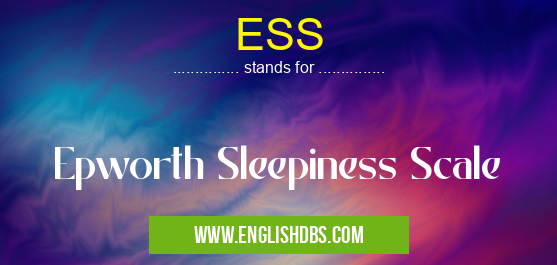What does ESS mean in NURSING
ESS (Epworth Sleepiness Scale) is a widely used questionnaire designed to assess subjective daytime sleepiness. It is frequently employed in clinical settings, sleep research, and occupational health evaluations. This article aims to provide a comprehensive understanding of ESS, including its purpose, scoring, interpretation, and limitations.

ESS meaning in Nursing in Medical
ESS mostly used in an acronym Nursing in Category Medical that means Epworth Sleepiness Scale
Shorthand: ESS,
Full Form: Epworth Sleepiness Scale
For more information of "Epworth Sleepiness Scale", see the section below.
Purpose
ESS is a self-report questionnaire that measures an individual's propensity to fall asleep during various daily activities. It consists of eight items, each describing a common situation where sleepiness may occur. Participants rate their likelihood of falling asleep in each situation on a 4-point Likert scale ranging from 0 (never) to 3 (high chance of dozing off).
Scoring
The total ESS score is calculated by summing the scores of the eight items. Scores can range from 0 to 24, with higher scores indicating greater daytime sleepiness.
Interpretation
- 0-10: Normal daytime sleepiness
- 11-14: Mild to moderate daytime sleepiness
- 15-24: Excessive daytime sleepiness
An ESS score of 10 or higher is often used as a clinical cut-off for further evaluation of potential sleep disorders.
Limitations
While ESS is a valuable tool for assessing subjective daytime sleepiness, it has certain limitations:
- Subjectivity: ESS relies on self-reporting, which can be influenced by factors such as memory and bias.
- Cultural and Contextual Factors: The relevance of the situations described in ESS may vary across cultures and individual contexts.
- Lack of Objectivity: ESS provides a subjective assessment of sleepiness, but it does not offer an objective measure of sleep or wakefulness.
Essential Questions and Answers on Epworth Sleepiness Scale in "MEDICAL»NURSING"
What is the Epworth Sleepiness Scale (ESS)?
The Epworth Sleepiness Scale (ESS) is a self-administered questionnaire that measures a person's propensity for excessive daytime sleepiness (EDS). It consists of eight questions that ask how likely the respondent would be to fall asleep in various situations, such as reading or sitting in a public place. The total score ranges from 0 to 24, with higher scores indicating a greater likelihood of EDS.
How is the ESS used?
The ESS is widely used in clinical practice to assess EDS and to monitor the effectiveness of treatments for sleep disorders. It can also be used in research studies to investigate the prevalence and risk factors for EDS.
What are the cut-off scores for the ESS?
The commonly used cut-off scores for the ESS are:
- Normal: 0-10
- Mild EDS: 11-15
- Moderate EDS: 16-20
- Severe EDS: 21-24 These cut-off scores are based on the distribution of ESS scores in the general population.
Are there any limitations to the ESS?
The ESS is a subjective measure, and its accuracy can be influenced by factors such as the respondent's mood, fatigue, and medication use. Additionally, the ESS does not distinguish between different causes of EDS, such as sleep deprivation, sleep disorders, or medical conditions.
What other measures can be used to assess EDS?
In addition to the ESS, other measures that can be used to assess EDS include:
- Multiple Sleep Latency Test (MSLT)
- Maintenance of Wakefulness Test (MWT)
- Actigraphy
- Sleep diaries These measures provide more objective assessments of EDS and can be used to confirm a diagnosis of a sleep disorder.
Final Words: ESS is a widely used and practical tool for screening and assessing daytime sleepiness. It provides a standardized method for obtaining a subjective estimate of an individual's propensity to fall asleep in various situations. However, it is important to interpret ESS scores cautiously, considering its limitations and using it in conjunction with other clinical evaluations when necessary.
ESS also stands for: |
|
| All stands for ESS |
